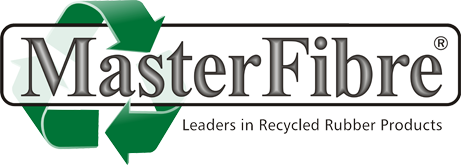


MasterFibre has just unveiled their new generation MasterPave rubber tiles. Utilising the latest in manufacturing technology the MasterPave is now machine made on a vulcanising press. This ensures consistency and world class quality for each and every MasterTile that gets manufactured.
The MasterTile products are a South African first and are rapidly growing in popularity with property developers and home makers alike. Due to its ease of installation as a DIY product and the ability to manufacture it at varying thicknesses (10mm, 15mm, 20mm, 25mm, 30mm, 35mm, 40mm, 45mm and 50mm) the MasterTile is perfect for everything from Play areas and walkways to entertainment areas and so much more.
MasterTile Rubber Tiles and flooring consists of a versatile material commonly used for commercial, residential, landscaping, sports and fitness purposes. This product has become very popular for several good reasons - they offer an attractive, non-slip, virtually maintenance-free and extremely durable flooring system.
We keep a firm focus on being environmentally responsible and providing ecologically sound solutions. MasterTile Rubber Tiles are made from recycled tyre rubber.
MasterTiles Rubber Tiles have earned their reputation for being extremely tough and long-lasting from their shock-absorbing qualities, which makes these rubber tiles able to handle high-impact and high traffic environments. The MasterTile material can be permanently bonded to a variety of surfaces with the use of an adhesive or you could choose the range of Rubber Interlocking Tiles, which require no adhesive and can be removed and replaced with great ease.
Applications:
Due to the product’s non-slip properties, MasterTile Rubber Tiles are suitable for use on sidewalks, driveways, playgrounds, and even for stable matting. These rubber tiles are great for use in outdoor areas like garden paths, around the swimming pool, on patios, verandas and balcony floors.
Specifications:
Advantages:
Installation:
MasterTile Rubber Tiles are extremely easy to install. Once you’ve measured the size of the area you want to cover, it is easy to calculate and order the number of tiles required. If necessary, they can easily be cut to size or shape with the use of a utility knife. All that remains is to lay the tiles in your chosen pattern.
A proper foundation is essential for achieving the best results when installing MasterTile Rubber Tiles. Depending on where you want to use the tiles, you might need to prepare your foundation. Once you have finished any excavation required, add a layer of crushed stone aggregate as your base material. This will make your foundation permeable, ensuring optimum drainage.
Important factors to keep in mind:
Tiles must remain dry prior to installation. Rubber tiles are porous and can absorb water which may cause them to expand. Expansion or contraction due to heat is another factor to be avoided prior to installation - just as tiles need to stay dry before installation, they should also be exposed to as little sunlight as possible. The surface of MasterTile Interlocking Rubber Tiles can also absorb dust and paint, and should therefore be covered with a protective material if they could be exposed to any of these elements – particularly in a construction environment.
Guidelines for maintenance:
MasterTile Interlocking Rubber Pavers are virtually maintenance-free, meaning there are no time-consuming or costly maintenance measures to be considered.
A high-pressure water hose is recommended for cleaning the surface of the pavers. Failing this, a simple sweep or mop (with or without water) will also suffice. No detergents are necessary.
In the unlikely event that a tile is damaged, it can be removed replaced at minimal cost and with very little effort.